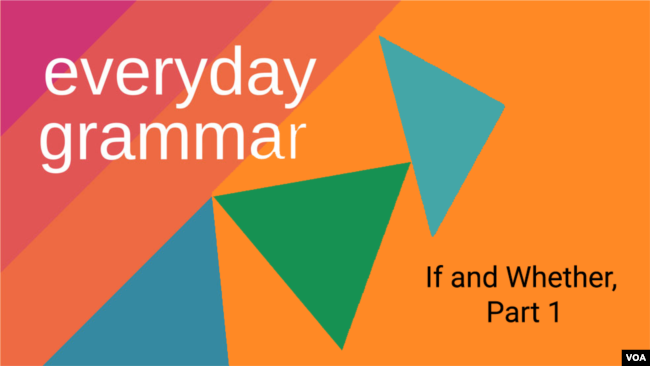“whether” "if " について
今日は every grammar を取り上げます。
ちょうど、前回取り上げた”COVID-19 Vaccine ‘Help Is on the Way’ ”
の中にこの文があって、あ~っと思ったからです。グッドタイミング!!
The FDA has the final decision on whether or not to approve or authorize emergency use of the vaccine.
プログラム1回目:whether” を使わなければならなくて、"if "を使えない場合
Let's get started!!!
Are you ready?
If and Whether, パート1
If and Whether, Part 1
November 19, 2020
"if "を使うか,“whether”を使うか迷ったことはありませんか?もしそうなら、それはあなただけではありませんよ。これらの単語が厄介なのには理由があります:それらは時に互換性があるからです。
場合によっては、どちらの単語を使っても意味に違いはありません。例えば、"I don't know whether she left yet" とか "I don't know if she left yet." と言う場合です。 しかしながら、他の場合は、”if" と “whether” は意味も使い方も違います。どちらかを選ばなければなりません。
”if "も “whether” も接続詞で、2つ以上の文や節をつなぐ言葉です。そして、その文法には多くのことが関係しているので、2回のプログラムでこのテーマを取り上げます。今日のプログラムでは、“whether” を使わなければならなくて、"if "を使えない場合に焦点を当てます。
“whether” という言葉は、二つの可能性しかないことを示しています。今日のプログラムでは、このことを心に留めておいてください。
不定詞の前
不定詞から始めましょう。
不定詞の前には "if "ではなく “whether” だけを使います。
不定詞は動詞の最も基本的な形です。アメリカ英語では、不定詞はto + 動詞を意味します。"To share "や "to get "などが例として挙げられます。
“whether” 単語の後に不定詞が続く文を聞いてみましょう:
My son got his favorite candy on Halloween. He cannot decide
whether to share some with his friends.
私の息子はハロウィンでお気に入りのキャンディをもらいました。
息子は友達といくつかをシェアするかどうか決められません。
ここでの “whether” の後の不定詞は "to share "です。繰り返しになりますが、不定詞の前に "if "を使ってはいけません。例えば、"He cannot decide if to share some with his friends. "と言ってはいけません。
ここにも例があります “whether”の後の不定詞を聞いてみましょう:
I am wondering whether to get a book or magazine to read.
私は読む本や雑誌を手に入れるかどうか迷っています。
ここでは “whether” に続く不定詞は "to get "です。
前置詞の後
次に、前置詞について説明します。
前置詞の後には、“whether” という単語を使います。“whether”の前によく使われる前置詞には、"about "や "in "などがあります。
次の例では、“whether”とその前に来る前置詞に注意してください:
Can we talk about whether you are coming for the holiday?
休日に来るかどうかについて話をしてもいい?
ここでは、前置詞 "about "が “whether” の前に来ています。ここでも、前置詞の後に "if "を使ってはいけません。例えば、"Can we talk about if you are coming for the holiday?" と言うのは避けましょう。
ここにも例があります。前置詞とそれに続く“whether” という単語を聴いてください:
Teachers are very interested in whether schools will reopen soon.
教師は学校がすぐに再開するかどうかにとても興味を持っています。
ここでは、前置詞 "in "が“ whether” の前に来ています。このため、"if "という単語は使えません。
‘or not’の前
次に "or not "という表現に移りましょう。
"or not "の前には "if "ではなく“whether” を直接使います。
つまり“whether or not” が正解です。"if or not "というフレーズは正しくありません。
例文を聞いて、私が何を言いたいのかを確認してください。“whether” という単語のすぐ後に "or not "が続いていることに注意してください。
I called to find out whether or not you are ok.
君が大丈夫かどうかを確認するために電話をしました。
”or not "の使用表現は必須ではなく、意味に影響を与えないことに注意してください。
また、これらの単語を文の最後につけることも可能です。例を挙げてみましょう:
I called to find out whether you are ok or not.
ただ、"or not "という単語は不要で、意味を変えないことを覚えておきましょう。
’~かどうかに関係なく'
しかし、それには一つの例外があります。
状況によっては "whether or not" は "~かどうかに関係なく” という意味になります。この意味では、"or not "という単語を入れなければなりません。
使われ方の例を聞いてみましょう:
Cassy is my friend whether Sam likes it or not.
サムがキャシーを好きかどうかに関係なく彼女は私の友達よ。
これは、話者がサムの友人関係についての意見を考慮していないことを意味しています。
主語で始まる場合
そして最後に、文の主語でもある名詞節を導くときには、"if "ではなく
“whether”という単語だけを使います。例を挙げてみましょう:
Whether he wins is not my concern.
彼が勝つかどうかは私の関心事ではありません。
この文の名詞節は「彼が勝つかどうか」で、文の主語になっています。
"If he wins is not my concern. "とは言いません。"if "は文の主語には使えません。“if” で文を始めるときは、条件を導入するもので、主語の一部ではありません。
今週のプログラムは以上です。パート2で、また近いうちにお会いしましょう。”if "を使わなければならない場合や “whether”と "if "に互換性がある場合についてお話します。
どちらを選べばいいのか、簡単に覚えられる方法もご紹介しますよ。
If and Whether, Part 1
 Everyday Grammar: If and Whether, Part 1
Everyday Grammar: If and Whether, Part 1
Have you ever been unsure about when to use “if” and when to use “whether”? If so, you are not alone. There is a reason these words can be tricky: They are sometimes interchangeable.
In some cases, either word can be used with no difference in meaning. For instance, you can say, “I don’t know whether she left yet” or “I don’t know if she left yet.”However, in other cases, “if” and “whether” have different meanings or uses. You have to choose one or the other.
Both “if” and “whether” are conjunctions – words that connect two or more sentences or clauses. And a lot is involved in their grammar, so I will cover this subject in two programs. Today’s program centers on when you must use “whether” and cannot use “if.”
The word “whether” signals that there are only two possibilities. Keep that in mind throughout today’s program.
Before infinitives
Let’s start with infinitive verbs.
Before infinitives, use only the word “whether,” not the word “if.”
An infinitive is the most basic form of a verb. In American English, the infinitive means to + verb. “To share” and “to get” are some examples.
Listen to a sentence that contains the word “whether” followed by an infinitive verb:
My son got his favorite candy on Halloween. He cannot decide whether to share some with his friends.
The infinitive verb after “whether” here is “to share.” Again, do not use “if” before infinitives. For example, do not say, “He cannot decide if to share some with his friends.”
Here is another example. Listen for the infinitive verb after “whether”:
I am wondering whether to get a book or magazine to read.
The infinitive following “whether” here is “to get.”
After prepositions
Next, let’s talk about prepositions.
After prepositions, use the word “whether.” Common prepositions before “whether” include “about” and “in.”
In this next example, pay attention for “whether” and the preposition that comes before it:
Can we talk about whether you are coming for the holiday?
Here, the preposition “about” comes before “whether.” Again, do not use “if” after a preposition. For instance, avoid saying, “Can we talk about if you are coming for the holiday?”
Here is another example. Listen for the preposition and the word “whether,” which follows it:
Teachers are very interested in whether schools will reopen soon.
Here, the preposition “in” comes before “whether.” Because of this, the word “if” cannot be used.
Before ‘or not’
Next let’s move to the phrase “or not.”
We use “whether,” not “if,” directly before the words “or not.”
In other words, the phrase “whether or not” is correct. The phrase “if or not” is incorrect.
Listen to an example to see what I mean. Take note that the word “whether” is immediately followed by “or not":
I called to find out whether or not you are ok.
Note that use of "or not" phrase is not required and does not affect meaning.
It is also possible to put those words at the end of the sentence. Here is an example:
I called to find out whether you are ok or not.
Just remember that the words “or not” are unneeded and do not change the meaning.
‘Regardless of whether’
However, there is one exception to that.
In some situations, "whether or not" can mean “regardless of whether.” For this meaning, you must include the words “or not.”
Listen to an example of how it is used:
Cassy is my friend whether Sam likes it or not.
This means that the speaker is not considering Sam’s opinion on the friendship.
At start of subjects
And finally, we use only the word “whether” – not “if” – when it introduces a noun clause that is also the sentence subject. Here is an example:
Whether he wins is not my concern.
The noun clause in this sentence is “Whether he wins” and it is the subject of the sentence.
We would not say, “If he wins is not my concern.” The word “if” does not begin sentence subjects. When “if” begins a sentence, it introduces a conditional and is not part of the subject.
That’s our program for this week. Join us again soon for Part 2. We will talk about when “if” must be used and when “whether” and “if” are interchangeable.
I will also show you an easy way to remember which one to choose!
____________________________________________________________
Words in This Story
interchangeable – adj. capable of being used in place of each other
clause – n. a part of a sentence that has its own subject and verb
candy – n. a sweet snack made with sugar or chocolate
phrase – n. a group of two or more words that usually forms a complete sentence
regardless (of) – adv. without being stopped or affected by something
introduce – v. to bring something into use or operation for the first time
